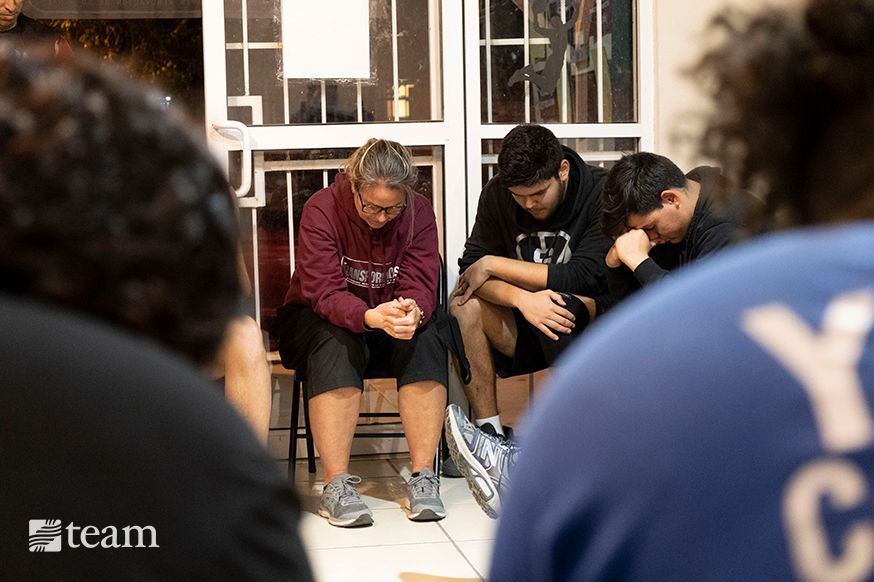When two visitors showed up at Cristian’s middle school, he had no idea that the basketball program they promoted would end three long years of loneliness.
It wasn’t easy growing up in La Paz, Mexico , where Cristian regularly navigated offers of drugs, family dysfunction and his own adolescent hormones.
And he was doing it pretty much all on his own.
He’d had some good friends, neighbors who provided a safe space and a listening ear — and who also pointed him to Jesus.
But they moved away. Where Cristian had once found friendship and spiritual guidance, now there was only emptiness .
“I kind of fell apart,” Cristian remembers.
Not Just a Sports Club
It was 2015, and TEAM missionaries had just launched Transformados (“Transformed”), a youth ministry in La Paz.
They began a basketball club and held practices at a public court, all the while looking for ways to get the word out to the community. They arranged a weekend basketball program at Cristian’s school, and TEAM missionary Phil Eager and a co-worker brought flyers to invite all the students .
Cristian already loved playing soccer and was interested in learning other sports too. So he was excited about Phil’s invitation. Plus the name Transformados caught his attention.
As he returned for practices, Cristian realized that Transformados was much more than a sports club. Phil and the other leaders cared about each student. Their deepest desire was for each one to know the love and peace of God.
For the first time in a long time, Cristian found companionship and connection.
Growth and Friendship
About a year later, Cristian approached Phil and asked if they could study the Bible together. Phil gladly said yes.
Their weekly time together has led to a close friendship. Cristian has continued to grow in his love for Jesus and now understands more fully what it means to follow Him.
“[Phil] would answer any questions I had,” Cristian says. And Cristian has had a lot of questions .
They have discussed the basics of the Christian faith and worked their way, verse by verse, through books of the Bible. Currently they’re doing an in-depth study on the Holy Spirit, and also discussing the significance of baptism.
Along with his spiritual growth, Cristian has gained something else, too.
“I have a friend,” Cristian says of Phil. “If I need something, I know I can count on him.”
’Just Like They Helped Me’

As Cristian grew in his skills and relationship with Christ, he took on a leadership role in Transformados. He wants to help other kids the way he was helped.
After two more years, Cristian started helping with summer basketball camps as a student leader. He continues to this day.
In addition to working with the younger students on their basketball skills, he and other students meet once a month for leadership training and to help with activity planning. (These activities continue as COVID-19 restrictions allow.)
“I like working with children and I like to teach what [Phil and others] have already taught me. … Just like they helped me, they guided me, I have the opportunity to guide other people,” Cristian says.
Life-on-Life Discipleship
The youth who attend Transformados, currently around 45, range in age from elementary to university students.
Phil says that the leaders’ desire for each one is the same: “We wanna see these kids’ lives changed for the better, to enter into a relationship with Jesus Christ and to be able to impact their community and their city and their country.”
Their philosophy of life-on-life discipleship shapes their daily activities and decisions.
“It’s more than just a basketball thing,” says Phil.
“[It’s] inviting the kids [and] their families into our life and being part of their lives,” says Pattie, Phil’s wife and co-leader . “Looking for opportunities to support them in their interests.”
It could mean welcoming kids over for coffee, to play games, practice music or shoot some hoops in their back yard. It also means cheering them on in school sports activities, supporting them in school leadership efforts, or walking with them through family loss.
“They know that we’re gonna be there for them,” says Pattie.

After practice, the teens gather for a time of Bible discussion and prayer, allowing them to draw near to God and ask questions.
A Vision to Help
Today Cristian is studying psychology as a university student, with a vision to someday help children and their families as a therapist.
He remembers what it was like to grow up in his neighborhood and the pitfalls of drug usage, teen alcoholism and domestic abuse. He knows kids face those same challenges today, and he wants to help them as he’s been helped .
“I want to teach people what the relationship with Jesus is like. … the way God works in us spiritually and how He can work with others,” he says.
Transformados = Family
Cristian is a natural competitor and still enjoys a good game of basketball. He especially likes basketball at Transformados, though.
Because it’s a chance to play with his team, whether they win or lose.
Because this group is a family for him.
“We all help each other,” he says. “We don’t leave anyone behind, but we move together. … A family is there in the good times and the bad times, and that’s what the Transformados team is all about.”
How Can You Pray for Cristian and for Transformados?
Pray that Cristian will stay strong in his faith and have discernment as he encounters philosophies in his university classes that challenge his relationship with Jesus.
Students face constant pressure to conform — from peers, social media, gangs and family traditions. Pray that each student would experience a truly transformative encounter with Christ and steady spiritual growth.
The Transformados team has dreams of expanding the ministry by purchasing land. Pray for God’s provision of property and for funds to purchase it.




















